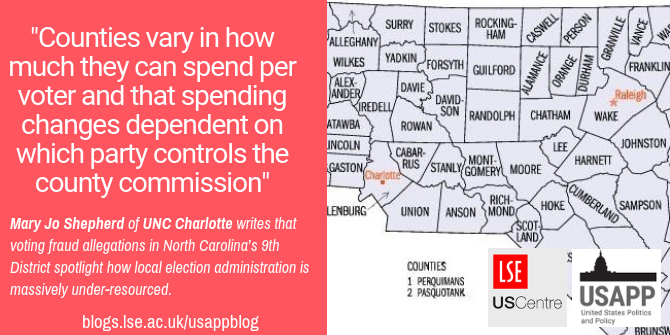 The 2018 midterm elections are not yet completely done and dusted: allegations of voting fraud in North Carolina’s 9th Congressional District have cast doubt on Republican Mark Harris’ narrow victory there. Mary Jo Shepherd writes on the unfolding situation in the Tar Heel State which is likely to undermine voters’ confidence in the electoral process. She argues that election failures seen in the 9th District show that election administration is in dire need of more resources in order to properly apply election laws.
The 2018 midterm elections are not yet completely done and dusted: allegations of voting fraud in North Carolina’s 9th Congressional District have cast doubt on Republican Mark Harris’ narrow victory there. Mary Jo Shepherd writes on the unfolding situation in the Tar Heel State which is likely to undermine voters’ confidence in the electoral process. She argues that election failures seen in the 9th District show that election administration is in dire need of more resources in order to properly apply election laws.
Rumors of voter fraud and campaign violations swirl in almost any election. Years ago, I was volunteering for a political party in my home county in North Carolina. Another volunteer related what I considered another rumor –somewhere down east in The Tar Heel State a political hack had delivered numerous mail-in absentee ballots to help secure a Democratic Party win. Lacking hard evidence, I dismissed it. I think back on that conversation which seems prescient considering the current controversy in North Carolina’s 9th Congressional district. Now, what had been rumors have become allegations of election fraud for Republican Mark Harris. Harris won the election with 905 votes over Democrat Dan McCready although McCready recently rescinded his concession in the race and the North Carolina State Board of Elections has refused to certify the results. North Carolina’s 9th Congressional district will lack representation in the next Congress unless this controversy is fixed.
The election fraud allegations, still under investigation by NC’s Board of Elections, indicate Mr. McCrae Dowless, a political operative employed by the Republican candidate Mark Harris, may have “harvested” mail-in absentee ballots. This is a process where an individual or an organization collects mail-in absentee ballots from voters and delivers them to the county board of elections. This is illegal in North Carolina. Harvested ballots could be delivered to elections officials or the ballots may be altered or destroyed. The evidence in this case is scanty and unclear, and the hearing on the evidence has been delayed until January 11, 2019. The situation has broadened beyond the Republican Party and Mark Harris; a local television station, WBTV, found that in Bladen County over one hundred mail-in absentee ballots were seen by two women affiliated with the NC Democratic Party. Reports of missing absentee ballots have surfaced in Columbus County, NC in just the past few days. The multiple allegations of fraud – some aimed at Mark Harris and some aimed at the Democratic Party – leave citizens confused, angry, their confidence in the electoral process damaged.
Allegations of election fraud, potentially by both parties, in a US Congressional race are very serious charges. The potential for altering or destroying harvested ballots subverts the democratic process at the most basic level. Multiple actors – including the parties, the county Board of Elections, and the candidate’s campaign- failed. Political parties failed to govern the third party operatives and consultants who have taken over functions that parties used to control. The county Board of Elections is supposed to validate each ballot they accept. What checks were missing in Bladen County that other counties have in place? Does Bladen County have too few employees running elections? Their website lists only four full-time employees covering about 25,000 registered voters. Candidates similarly need to do their due diligence when outsourcing election activities to others. At the moment, the burden is on the candidates to ensure they hire contracted workers with outstanding reputations.

Florida counties is Public Domain.
These election failures in North Carolina’s 9th Congressional district election shed light on the need for election reforms. The distance between parties and candidates means that candidates may not be getting the advice and support they need from local parties. North Carolina’s 9th district stretches some two hundred miles east to west over eight counties; a candidate would encounter eight county parties. That is eight county party leadership organizations, eight boards of elections, plus one congressional district leadership organization. There is no guarantee that the Mecklenburg County (in the western part of the district) knows exactly what is going on in Bladen County. So how is a candidate to know all the players who are part of get out the vote (GOTV) initiatives? Candidates might rely on the Congressional district leadership for some guidance but because counties are running elections, it is more likely that a candidate relies on local leaders – and local contacts – for help with GOTV efforts. The disparate electoral system likely played a part in the decision by Mark Harris to seek GOTV help from a locally based actor. More information regarding voting and election irregularities shared between counties and with the state would help alleviate this issue. Relying on rumors and word of mouth is inadequate to secure the voting process.
Reducing the potential for election fraud using absentee ballots should involve applying the laws already on the books. The county Boards of Election are tasked with ensuring the integrity of each mail-in absentee ballot. That is a difficult task given that resources for election administration are often sparse. Counties vary in how much they can spend per voter and that spending changes dependent on which party controls the county commission. Recent research has found that once a county has a large Republican majority vote in presidential races, those county commissions spend significantly less on elections than non-Republican commissions County spending on elections – which includes personnel to manage elections likely had an impact on this controversy. The resources necessary to validate each mail-in absentee ballot may have been inadequate to do the job. To safeguard elections here in North Carolina we must further understand the nature of the continuing allegations of voter and campaign fraud and what role election administration plays in the solution.
Please read our comments policy before commenting.
Note: This article gives the views of the author, and not the position of USApp– American Politics and Policy, nor of the London School of Economics.
Shortened URL for this post: https://bit.ly/2EDGoyo
About the author
 Mary Jo Shepherd – UNC Charlotte
Mary Jo Shepherd – UNC Charlotte
Mary Jo McGowan Shepherd is a lecturer in the Department of Political Science and Public Administration at UNC Charlotte. Her research interests are in Public Policy, Policy Process, Institutions, Campaign Finance, Elections Administration.






